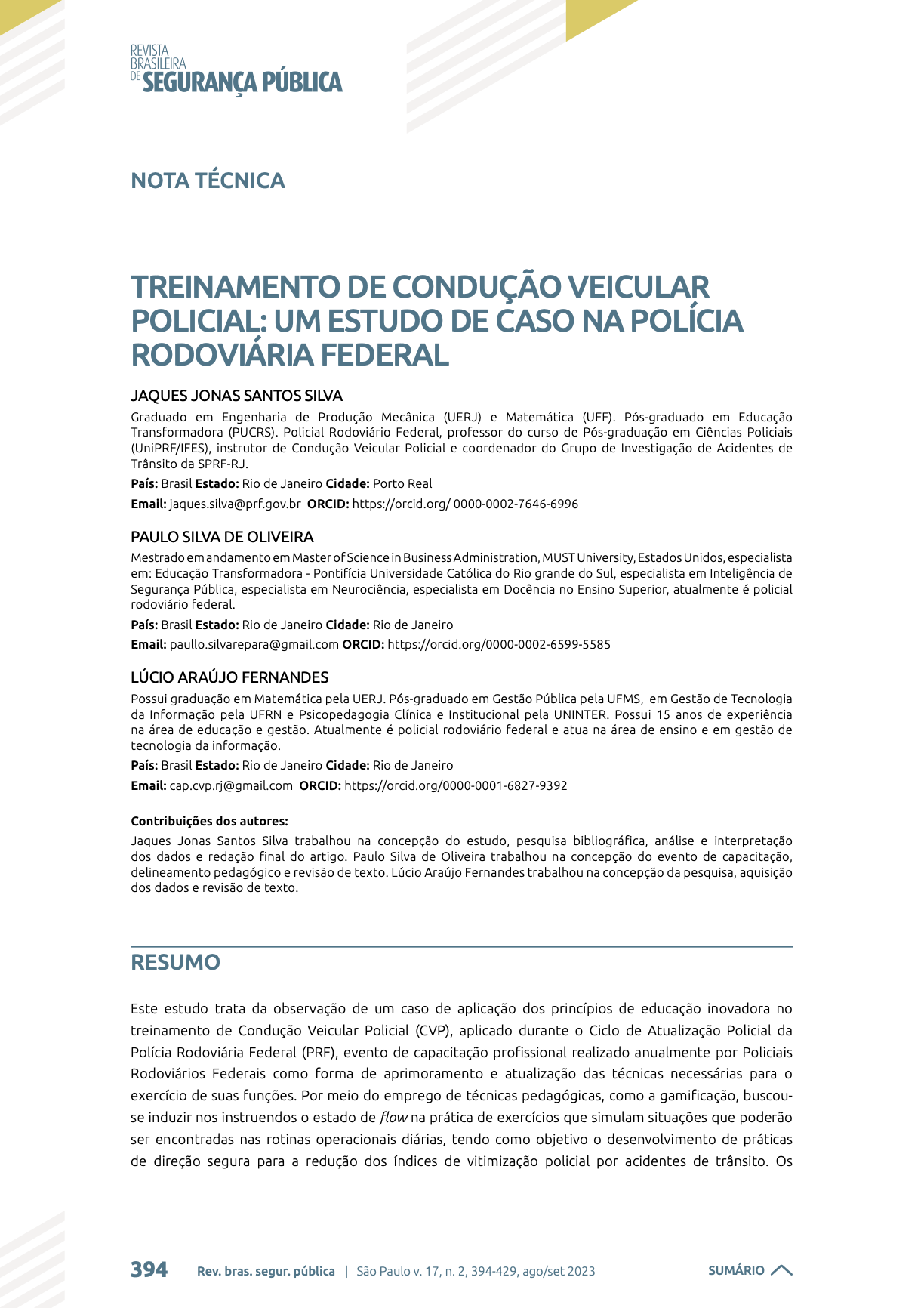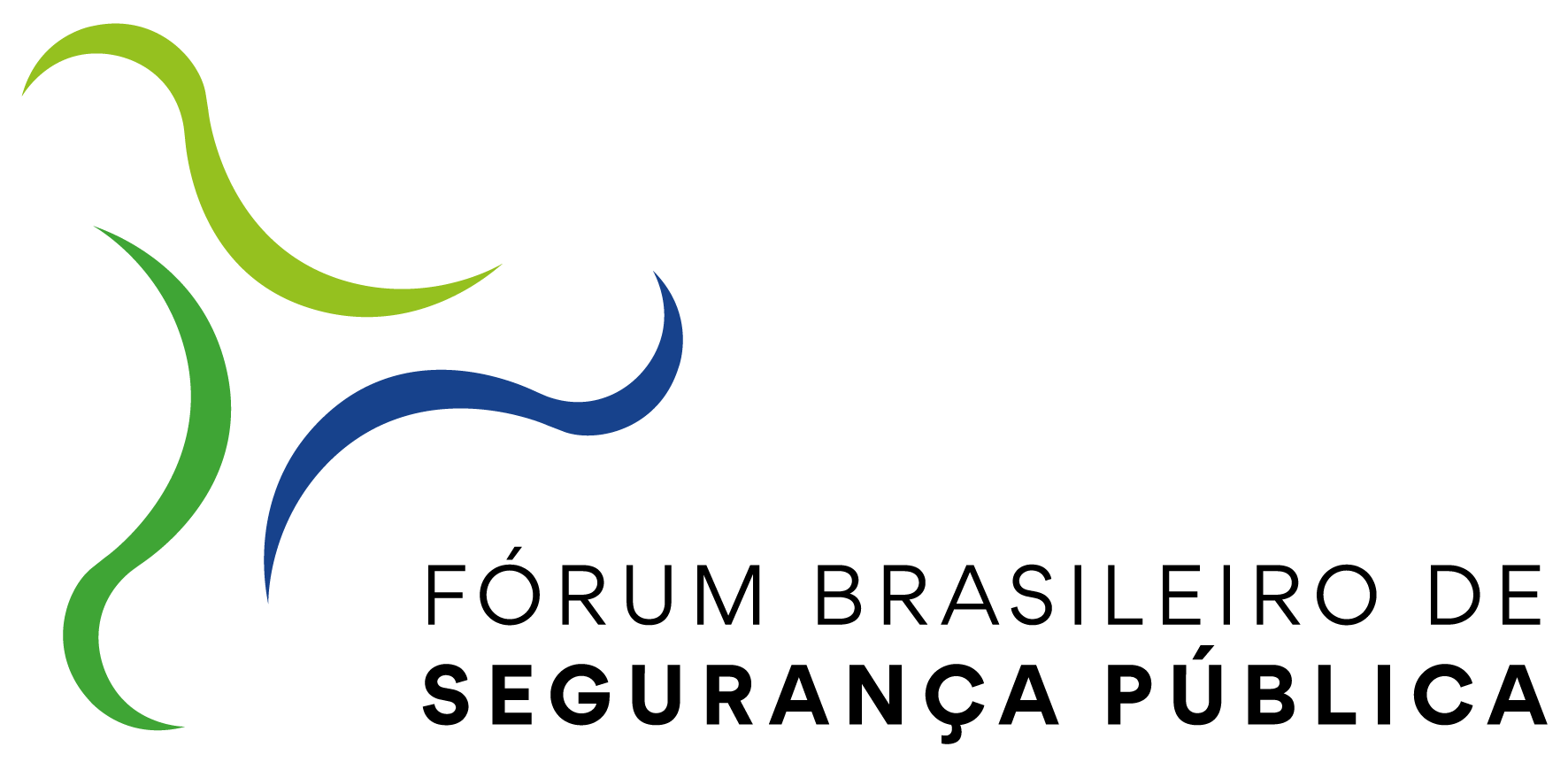Police vehicle driving training
a case study in the federal highway police
DOI:
https://doi.org/10.31060/rbsp.2023.v17.n2.1599Keywords:
Traffic, Driving, Vehicles, Police, TrainingAbstract
This study deals with the observation of a case of application of the principles of innovative education in Police Vehicle Driving (PVD) training, applied during the Police Update Cycle of the Federal Highway Police (PRF), a professional training event held annually by police officers as a way to improve and update the techniques necessary for the exercise of their functions. Through the use of pedagogical techniques such as gamification, we sought to induce in the trainees the state of flow in the practice of exercises that simulate situations that may be found in daily operating routines, with the objective of developing safe driving practices for reduction of police victimization rates due to traffic accidents. The observed results point to a high level of commitment of the trainees and reveal the importance of PVD training within the scope of PRF's corporate education.
Downloads
References
COSTA, J. M. S.; MIRANDA, O. J. N. As implicações da formação específica para condutores de viaturas oficiais no 6º BPM-AC. Artigo (Habilitação de Oficial Administrativo) – Centro de Ensino da Polícia Militar do Acre, Rio Branco/AC, 2020, p. 4.
CSIKSZENTMIHALYI, M. Flow: The psychology of optimal experience. USA: Harper Perennial Modern Classics, 1990.
DAILY, J.; SHIGEMURA, N.; DAILY, J. Rotacional Mechanics. In: DAILY, J.; SHIGEMURA, N.; DAILY, J. Fundamentals of Traffic Crash Reconstruction. Florida/USA: DAILY, 2006, v. 2. Cap. 9, p. 275-279.
DORILEO, A. W. A direção policial preventiva como possibilidade de controle do número de acidentes com vítimas na Polícia Militar do Estado de Mato Grosso. Homens do Mato – Revista Científica de Pesquisa em Segurança Pública, v. 7, 2011.
FARDO, M. L. A gamificação aplicada em ambientes de aprendizagem. Renote, v. 11, n. 1, 2013.
HOFFMANN, M. H. Comportamento do condutor e fenômenos psicológicos. Psicologia: Pesquisa e Trânsito, v. 1, n. 1, p. 17-24, 2005.
JALONETSKY, A. Curso de Direção Policial: use as técnicas da ROTA para dirigir seu carro. IG, Último Segundo, Brasil, 25 mai. 2017. Citado por COSTA, J. M. S.; MIRANDA, O. J. N. In: As implicações da formação específica para condutores de viaturas oficiais no 6º BPM-AC. Artigo (Habilitação de Oficial Administrativo) – Centro de Ensino da Polícia Militar do Acre, Rio Branco/AC, 2020, p. 12.
LIMEIRA, M. L. C.; DONATO, R. S. Análise dos acidentes de trânsito com morte de Policial Militar em serviço na Brigada Militar – de 2006 a 2016. Produto & Produção, v. 20, n. 2, p. 42-61, 2019.
MARIN, L.; QUEIROZ, M. S. A atualidade dos acidentes de trânsito na era da velocidade: uma visão geral. Cadernos de Saúde Pública, v. 16, n. 1, jan./mar. 2000.
MARTINS, W. M. Fatores de Risco e Vitimização Fatal de Policiais: uma análise sobre a Polícia Rodoviária Federal (PRF) no Brasil (2007-2016). TCC (Especialização em Políticas e Gestão em Segurança Pública) – Escola de Administração, Universidade Federal da Bahia, Salvador/BA, 2016.
MARTINS, W. M. Fatores de Risco e Vitimização Fatal de Policiais: uma análise sobre a Polícia Rodoviária Federal (PRF) no Brasil (2007- 2021). 2021. Apresentação do Power Point.
MONTANARO, P. R. Gamificação para a Educação. Inovaeh, UFSCar, 2018. [e-book].
MORAIS, A. M. Fatores do comportamento humano que implicam no envolvimento de Policiais Militares em acidentes de trânsito: estudo sobre as percepções de condutores de viaturas da Polícia Militar do Estado do Amazonas. Homens do Mato – Revista Científica de Pesquisa em Segurança Pública, v. 7, jul./dez. 2011.
MUNIZ, J. O.; SOARES, B. M. (Coords.). Mapeamento da vitimização de policiais no Rio de Janeiro. Rio de Janeiro: Iser, Unesco, Ministério da Justiça, 1998.
MUNIZ, J. O.; SOARES, B. M. Estudo exploratório sobre vitimização, letalidade e saúde ocupacional nas Polícias de São Paulo: sugestões para um programa de ação federativa. PNUD, Ministério da Justiça e Segurança Pública, Secretaria Nacional de Segurança Pública, 2011.
NEWTON, I. The Principia: mathematical principles of natural philosophy. University of California Press, 1999.
NUNES, R. C. T. Um modelo de dados voltado ao treinamento e formação policial. TCC (Especialista em Tecnologias da Informação e Comunicação aplicadas à Segurança Pública e Direitos Humanos) – Universidade Federal de Santa Catarina, Araranguá/SC, 2017.
PEREIRA, E. R. Fundamentos de ergonomia e fisioterapia do trabalho. Rio de Janeiro: Taba, 2002.
POLÍCIA MILITAR DO ESTADO DE SÃO PAULO – PMESP. Despacho Nº PM3-008/03/08, 24 jan. 2008, constante do Boletim Geral da PMESP. São Paulo, 2008. Citado por COSTA, J. M. S.; MIRANDA, O. J. N. In: As implicações da formação específica para condutores de viaturas oficiais no 6º BPM-AC. Artigo (Habilitação de Oficial Administrativo) – Centro de Ensino da Polícia Militar do Acre, Rio Branco/AC, 2020, p. 12.
ROZESTRATEN, R. J. Psicologia do trânsito: conceitos e processos básicos. São Paulo: Edusp, 1988.
SAMPIERI, R. H.; COLLADO, C. F.; LUCIO, M. P. B. Definiciones de los enfoques cuantitativo y cualitativo, sus similitudes y diferencias. In: SAMPIERI, R. H.; COLLADO, C. F.; LUCIO, M. P. B. Metodología de la investigación, 2006, p. 2-19.
SÖDERLUND, N.; ZWI, A. B. Mortalidad por accidentes de tránsito en países industrializados y en desarrollo. Boletín de la Oficina Sanitaria Panamericana, v. 119, n. 6, p. 471-480, 1995.

Published
How to Cite
Issue
Section
License
Copyright (c) 2023 Revista Brasileira de Segurança Pública

This work is licensed under a Creative Commons Attribution 4.0 International License.
Licensing
The Brazilian Journal of Public Security uses the Creative Commons License as a form of licensing for its published works. The license used follows the CC BY 4.0 - Attribution 4.0 International model.
To see the permitted rights please go to the full licence or to our Copyright and Licensing page.


